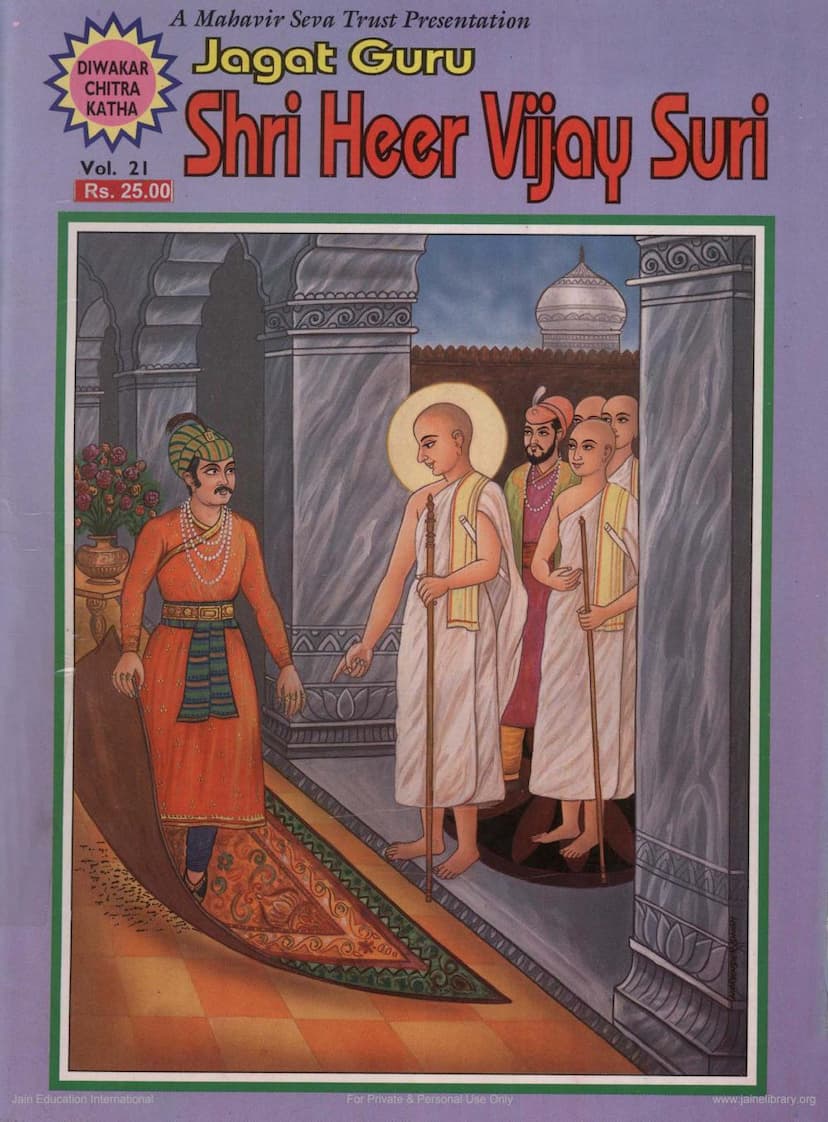Jagatguru Heervijayji Diwakar Chitrakatha 021
Added to library: September 1, 2025

Summary
This document is the 21st installment of the "Jagatguru Heervijayji Diwakar Chitrakatha" series, published by Mahavir Seva Trust, Mumbai. It tells the life story of Jagatguru Shri Heer Vijay Suri, a prominent Jain Acharya who lived in the 16th century.
The book highlights Shri Heer Vijay Suri's significant influence on both Jainism and the history of the Indian subcontinent. It details his profound impact on the Mughal emperor Akbar, who greatly respected and was influenced by the Acharya's teachings on religious tolerance, ahimsa (non-violence), and public service. This influence led Akbar to promulgate ordinances banning animal slaughter for specific periods and to refrain from hunting and meat-eating himself for part of the year.
The narrative follows Heer Vijay Suri's life from his birth in Palanpur, his early education, his strong inclination towards religion, and his eventual initiation as a Jain monk, Muni Heer-harsh. His intellectual prowess, eloquent oration, and virtuous conduct are emphasized throughout his journey. The book recounts his interactions with various individuals, including merchants, rulers, and the emperor Akbar.
Key events described include:
- Akbar's Respect: Akbar's reverence for Shri Heer Vijay Suri was so great that it was rumored he had converted to Jainism.
- Disciples' Influence: Prominent disciples like Vijayasen Suri and Bhanuchandra Upadhyaya continued to maintain contact with Akbar, guiding him towards ahimsa and welfare.
- Heerji's Devotion: Even as a child, Heerji showed a preference for knowledge over material comforts, famously stating he was consuming "sweets of knowledge."
- Asceticism and Renunciation: The book emphasizes Shri Heer Vijay Suri's commitment to asceticism, including his refusal of royal honors and his strict adherence to Jain principles of detachment and non-possession.
- Miraculous Feats: The text mentions instances where his blessings or interventions led to miraculous cures, such as the healing of Seth Ratnapal Dosi's son.
- Meeting with Akbar: The detailed account of Heer Vijay Suri's invitation to and reception at Akbar's court in Fatehpur Sikri highlights the emperor's eagerness to meet him.
- Dialogues with Akbar: Their conversations showcase Heer Vijay Suri's wisdom on detachment, compassion, and the principles of Jainism. A significant anecdote involves Suriji's refusal to walk on a carpet until he ensured no living beings were harmed underneath, demonstrating his deep respect for all life.
- Promoting Ahimsa: The book details how Heer Vijay Suri persuaded Akbar to ban animal slaughter during the Paryushan Parva, and even extended the ban by four days. Akbar's release of caged birds at Suriji's request is also highlighted as a testament to his compassionate nature.
- Jagatguru Title: Emperor Akbar bestows the title of "Jagadguru" (Universal Teacher) upon Heer Vijay Suri in recognition of his profound wisdom and influence.
- Disciples' Continued Influence: After Heer Vijay Suri's departure for Gujarat, his disciples Bhanuchandra ji and Siddhichandra ji continued to influence Akbar, with Bhanuchandra ji curing him of a severe headache and advising against animal sacrifice.
- Interactions with Other Rulers: The book also mentions Heer Vijay Suri's interactions with Muslim rulers and a cruel ruler like Maharao Surtan of Sirohi, whom he convinced to release unjustly imprisoned merchants.
- Pilgrimage and Passing: The narrative concludes with Heer Vijay Suri undertaking a pilgrimage to Siddhachal and his eventual passing at Una, described as a serene and dignified departure.
The latter part of the document also includes a section titled "Compassionate Heart" which discusses vegetarianism from a philosophical and health perspective, reinforcing the Jain emphasis on ahimsa and kindness to all living beings. It also promotes other books in the "Chitra Katha" series.